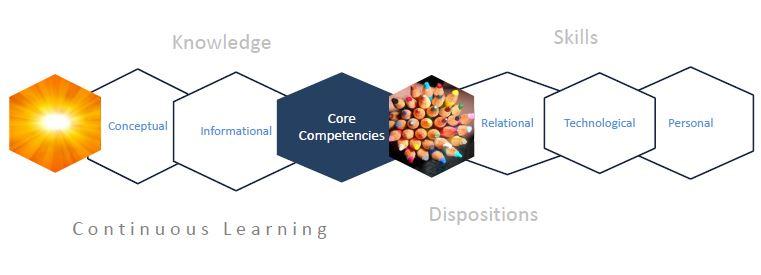
The following statement of academic advising core competencies is grounded in the competency areas initially identified by Wes Habley (1995) (Conceptual, Informational, Relational) and Jeffrey McClellan (2007) (Technological and Personal). Their work has been expanded by Elizabeth Wilcox, Sr. Consultant for Advising at UC Berkeley, in collaboration with the UC Berkeley Advising Council and with input from NACADA's Professional Development Committee, into the following detailed identification of area-specific knowledge, skills, and dispositions that support academic advising. The following competencies statement can be used to guide professional development and promote the contributions of advising to learning, student development, progress, and success. Though this document was initially released publicly in April 2016, this is a "living" document that will continue to evolve over time. It can be used by:
- Advisors: for self-assessment and evaluation, and to guide learning, career development, and advancement.
- Supervisors, Managers, and Mentors: to identify strengths, stretch goals, and areas for staff development, and to guide hiring, training, and evaluation.
- Learning Professionals and Trainers: to support curriculum development and establish learning priorities.
- Faculty and Administrators: to clarify academic advising roles and responsibilities, and highlight the contributions of academic advising to teaching and learning.
Core Competency Quick Review
click here for full table or click on each core competency in the table or in the left side menu for a full review
ConceptualAn understanding of the conceptual and theoretical foundations of advising. An ability to develop inclusive and ethical practices consistent with program and population needs that promote learning, student development, progress and success. |
InformationalInstitution specific knowledge of academic disciplines, curriculum, programs, requirements, policy, rules, regulations, procedure, tools and resources. An understanding of the legal and ethical responsibilities of advising. An ability to form productive connections and coalitions with campus partners. |
RelationalThe ability to employ the interpersonal skills needed to facilitate a student-centered, inclusive, and culturally sensitive advising relationship. The ability to reflect on and adapt one’s practice to improve rapport. |
TechnologicalThe ability to use student systems to effectively support student progress. An ability to employ new technologies to engage and inform students. An ability to use data from a variety of sources including central systems to construct and improve service and for planning and evidence based decision-making. |
PersonalThe ability to engage in regular analysis and self-assessment of the advising practice to learn, grow and improve performance. |
Examples of the Core Competencies in Practice: Knowledge + Skills + Dispositions (click to read more)
Competencies include a blend of what advisors know, do, and value. As advisors develop competencies, they may think not only about what you know, but also how this knowledge is translated into practice and expressed through habits, attitudes, and behavior.
Strategies for Developing and Using Core Competencies (click to read more)
UC Berkeley's core competencies statement underscores the incredibly broad and deep range of knowledge and skills required for effective advising. Acquiring this knowledge and applying and refining related skills is an on-going challenge and necessity.
The Academic Advising Toolbox (click to read more)
In practice, advising is a fluid and dynamic exchange requiring significant flexibility on the part of the advisor. To effectively meet individual student needs and tailor advising to individual interests and goals, the advisor must often blend and synthesize a variety of advising approaches and methods in a single appointment.
Undergraduate Advising at Key Transition Points (click to read more)
Learning centered advising is particularly important when it is provided at key transition points.
Advising Dispositions: Habits, Attitudes, Behaviors (click to read more)
Advising is supported by critical “dispositions”, a blend of habits, attitudes and behaviors that help to shape and support practice.
The 70:20:10 model of professional development (Lombardo & Eichinger, 2000) may help guide learning and development. It suggests that 70% of learning is gained through hands-on-experience, 20% through social learning (coaching and mentoring), and 10% through formal instruction.
